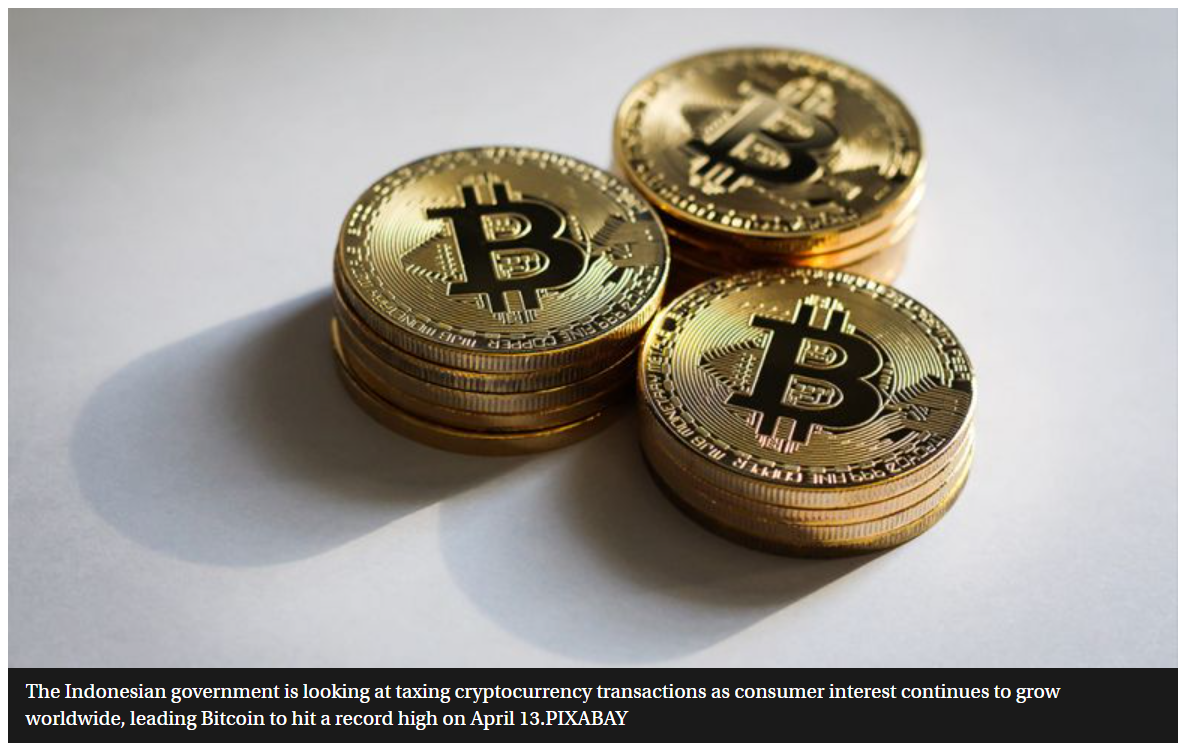Indonesia futures regulator mulls crypto transaction tax
Indonesia’s Commodity Futures Trade Regulatory Agency (Bappebti) is considering a plan to tax cryptocurrency transactions amid rising public interest in the digital asset, especially in the past year.
According to the agency, which falls under the trade ministry, the government is expected to impose a type of final income tax (PPh Final) on transactions using virtual currency, to be automatically levied by the 13 cryptocurrency trading platforms registered with Bappebti.
“It is currently [undergoing] internal review at Bappebti, then we will coordinate with the BKF,” Bappebti head Sidharta Utama told The Jakarta Post by text message on April 20, referring to the finance ministry’s Fiscal Policy Agency. He added that the tax rate had not been discussed.
The BKF confirmed separately with local media that it had not received official word from Bappebti on the agency’s planned cryptocurrency tax.
Bappebti has taken several steps in recent months to tighten control over cryptocurrency trading amid the rising popularity of virtual currency worldwide.
In December, the agency issued a regulation that recognised 229 cryptocurrencies as legally tradable commodities and this February, it issued another regulation to recognise the 13 platforms as licensed cryptocurrency trading platforms.
With growing consumer interest in the digital asset, the value of Bitcoin (BTC), the world’s largest cryptocurrency, recently reached a record high of $63,000. But the volatile currency’s value slipped on April 22 to a one-month low of $51,701.
Indonesian Crypto Asset Traders Association (Aspakrindo) executive chairman Teguh Kurniawan Harmanda said the organisation had proposed a rate of 0.05 per cent for the planned cryptocurrency transaction tax, lower than the tax rate for shares’ transaction value on the local bourse.
“To date, there has been no feedback on the type of tax,” Teguh was quoted as saying on April 19 by business newspaper Kontan. “We hope the tax rate will not be too high, [or] we fear that investors may turn to investing in crypto [assets] through illegal channels, which would be harmful.”
He added that crypto assets reached 40 trillion rupiah ($2.8 billion) per month in average transaction volume last year, or around 480 trillion rupiah for the whole year.
Cryptocurrency transactions in Indonesia are regulated primarily under Trade Ministerial Regulation No 99/2018 on crypto asset trading.
While local regulations allow cryptocurrencies to be traded as a commodity, they may not to be used as a payment instrument, a function that is exclusive to the rupiah as stipulated by the 2011 Currency Law.
Oscar Darmawan, CEO of Indodax, one of the country’s largest crypto exchange platforms, expressed support for the tax plan, saying that he did not expect it would burden investors.
Indodax has seen its user base surge 50 per cent annually to three million users this year. However, blockchain transactions in Indonesia contributed only one per cent to worldwide transactions, so virtual currency was thus not a huge source of potential tax revenue.
“[Blockchain adoption] is just not optimal yet,” Oscar told the Post by text message on April 23, adding that increasing local adoption of the technology would require “a lot of support, such as from the government”.
THE JAKARTA POST/ASIA NEWS NETWORK


 English
English




